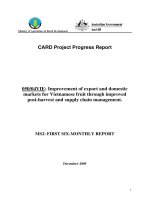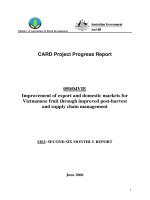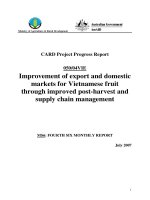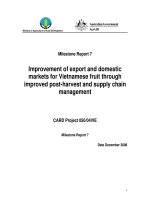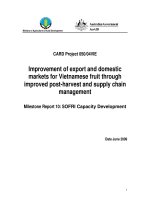LM 2020 introduction to logistics and supply chain management – Level 4
Bạn đang xem bản rút gọn của tài liệu. Xem và tải ngay bản đầy đủ của tài liệu tại đây (86.56 KB, 4 trang )
DEREE COLLEGE SYLLABUS FOR:
LM 2020 INTRODUCTION TO LOGISTICS AND SUPPLY CHAIN MANAGEMENT – LEVEL 4
US CREDITS: 3/0/3
UK CREDITS: 15
(New, Spring 2015)
PREREQUISITES:
None
CATALOG
DESCRIPTION:
Overview of the logistics and supply chain industry. The logistics and
supply chain context, importance of logistics and supply chain
management to value offered, economic impact of logistics and supply
chain industry, functions and operations, basic principles.
RATIONALE:
The module focuses on the theories and practice of logistics and supply
chain management. By taking this module students acquire an
understanding of the context of logistics and supply chain management,
as well as knowledge of the theory and tools of modern logistics and of
related management processes and functions within the industry and its
different segments. Students will also acquire an understanding of the
challenges and opportunities in the context of logistics and supply chain
management at the local, national and international levels.
LEARNING OUTCOMES:
As a result of taking this module, the student should be able to:
1. Describe the nature, scope and structure of the logistics and supply
chain operations.
2. Explain the strategic and operational planning involved in creating
and running a high value supply chain.
3. Identify the dynamic implications involved in managing critical
functions of logistics and supply chain management.
METHOD OF TEACHING AND
LEARNING:
In congruence with the teaching and learning strategy of the college, the
following tools are used:
ASSESSMENT:
Classes consist of lectures, discussions, collaborative in-class small
projects and specialized video presentations. Throughout the
lectures students develop knowledge and understanding related to
the subject content. Discussions and collaborative in-class small
projects reinforce students’ cognitive and key transferable skills.
Specialized video presentations familiarize students with
professional skills and further develop their cognitive skills.
Office Hours: Students are encouraged to make full use of the office
hours of their instructor in order to consult and discuss issues
related to the course's content.
Use of blackboard site, where instructors post lecture notes,
assignments instructions, timely announcements, as well as
additional resources.
In-class, 1-hour, "diagnostic" test formative
Midterm Examination (1-hour) summative
Final Examination (2-hour) summative
0%
40%
60%
Essay-type
questions
Essay-type
questions
Essay-type
questions
The formative test aims to prepare students for the summative
assessments.
The Midterm Examination tests Learning Outcome 1.
The Final Examination tests Learning Outcomes 2 and 3.
INDICATIVE READING LIST:
REQUIRED MATERIAL:
Waters, D. Logistics: An Introduction to Supply Chain Management,
Palgrave: Macmillan, latest edition
RECOMMENDED READING:
BOOKS
Arnold, J.R.T., Chapman, S.N., and Clive, L.M. (2010), Introduction
to Materials Management, 7th ed., Prentice Hall, ISBN-10:
0131376705, ISBN-13: 978-0131376700
Christopher, M. (2007). Logistics and Supply Chain Management,
Pearson Education Limited.
Harrison, A. & van Hoek, R. (2008). Logistics Management and
Strategy, 3rd, ed., Prentice Hall.
Hugos M. (2011). Essentials of Supply Chain Management, New
Jersey: John Wiley & Sons.
Min. H. (2015), Essentials of Supply Chain Management, The: New
Business Concepts and Applications, Pearson, ISBN-10:
0134036239 | ISBN-13: 9780134036236
Sanders N. (2012). Supply Cain Management: A Global Perspective,
John Wiley and Sons.
Wisner J., Tan K-C & Leong G. K. (2009). Principles of Supply Chain
Management, 2nd ed., Cengage.
ARTICLES
Corominas, A. (2013). Supply chains: what they are and the new
problems they raise. International Journal of Production Research,
51(23/24), 6828-6835.
Lichocik, G., & Sadowski, A. (2013). Efficiency of supply chain
management. Strategic and operational approach. Logforum, 9(2),
119-125.
Arzu Akyuz, G., & Erman Erkan, T. (2010). Supply chain
performance measurement: A literature review. International Journal
of Production Research, 48(17), 5137-5155.
Randall, W. S., Wittmann, C., Nowicki, D. R., & Pohlen, T. L. (2014).
Service-dominant logic and supply chain management: are we there
yet?. International Journal of Physical Distribution and Logistics
Management, 44(1/2), 113-131.
Glatzel, C., Großpietsch, J., & Silva, I. (2011). Is your top team
undermining your supply chain?. Mckinsey Quarterly, (1), 72-77.
Christopher, M., & Ryals, L. J. (2014). The Supply Chain Becomes
the Demand Chain. Journal of Business Logistics, 35(1), 29-35.
JOURNALS
Business Process Management Journal
Harvard Business Review
International Journal of Logistics Management
International Journal of Operations and Production Management
International Journal of Physical Distribution and Material Flow
International Journal of Productivity and Performance Management
International Journal of Quality and Reliability Management
International Journal of Retail and Distribution Management
International Journal of Service Industry Management
Journal of Business Logistics
Logistics Today
Strategic Management Journal
COMMUNICATION
REQUIREMENTS:
Assignments presented in Word.
Use of appropriate terminology.
SOFTWARE
REQUIREMENTS:
Blackboard, MS Office, search engines
WWW RESOURCES:
Students are expected to use the internet at their own discretion to
select information on the module. Useful sources include:
Council of Supply Chain Management Professionals (CSCMP)
Institute for Supply Management (ISM)
International Federation of Purchasing & Supply Management (IFPSM)
Logistics Management
Logistics Quarterly
Logistics Viewpoints
Material Handling Management
MM&D
Packaging News
Procurement Insights
SCM Resource Centre
Supply Chain & Logistics Association Canada (SCL)
Supply Chain Council (SCC)
Supply Chain Digital
Supply Chain Intelligence
Supplymanagement.com
INDICATIVE CONTENT:
1.
2.
3.
4.
5.
6.
7.
8.
9.
10.
11.
12.
Logistics and Supply Chains
Development of Logistics
Logistics Strategy
Integrated Supply Chains
Global Logistics
Locating Facilities
Capacity Management
Flows of materials
Procurement
Inventory Management
Warehousing
Transport

